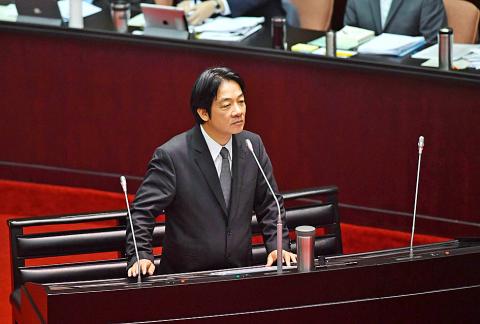Premier William Lai (賴清德) yesterday called for a new cross-strait development plan, while urging Beijing to ease hostility toward Taipei and refrain from supporting specific groups in Taiwan.
During a plenary session of the legislature, Lai wished the Chinese Communist Party (CCP) success at its 19th National Congress, which is to begin today, while calling on Chinese President Xi Jinping (習近平) to adjust his strategy toward Taiwan.
“Beijing has tried to isolate Taiwan from the international community and divide Taiwanese society, and it has even supported specific groups, which, frankly speaking, is asking the wrong man for the job and is unhelpful for peaceful cross-strait development,” Lai said.

Photo: CNA
Lai was referring to a disturbance caused by pro-unification parties and groups allegedly linked to organized crime and having received funding from Beijing.
“Following the 19th National Congress, President Xi should properly assess past cross-strait interactions and continue mutually beneficial exchanges while adjusting ineffective and counterproductive moves,” Lai said.
Chinese Nationalist Party (KMT) Legislator Lu Yu-ling (呂玉玲) asked if Lai’s insistence on Taiwanese independence could provoke a response from Beijing, to which Lai said that sincerity and honesty prevent misunderstanding.
Lai, in his first legislative interpellation session on Sept. 26, reaffirmed his pro-independence stance, saying he is a “pragmatic independence politician.”
Meanwhile, China’s military activities have decreased and there is no apparent change to its foreign policies ahead of the congress, the Cabinet said.
Lu asked if China had made any unusual military arrangements ahead of the congress, to which Lai said there was a personnel reshuffle and the Cabinet had a good grasp of the situation, but refused to comment further.
Minister of National Defense Feng Shih-kuan (馮世寬) said that Beijing’s frequent military activities around Taiwan have relented since China’s National Day holidays, due in part to weather conditions and the long weekend.
There is no sign of any aggressive military arrangements, suggesting that Beijing’s attitude has eased, Feng said.
On the diplomatic front, Taiwan’s relations with its diplomatic allies are stable, Minister of Foreign Affairs David Lee (李大維) said.
“There has always been a tug-of-war with China in foreign relations. It started long before May 20 last year [when President Tsai Ing-wen (蔡英文) was inaugurated]. It has always been like this. Sometimes China exerts more pressure, but it is relatively stable now,” Lee said.
Meanwhile, Lai said that Taiwan would interact with China on the principles of equality and mutual respect during the APEC summit, after KMT Legislator Lai Shyh-bao (賴士葆) questioned if Taiwan’s participation under the name “Chinese Taipei” might damage the nation’s dignity.
Citing Tsai’s statement that her administration is willing to have friendly interactions with Beijing under the APEC framework, Lai said that it might be an affront to Taiwan’s sovereignty because the nation cannot join APEC as a state.
The public should support Tsai’s proposal, which seeks to achieve a common ground with Beijing to develop cross-strait relations on the right track, Lai said.
Taiwan and China are to interact as separate APEC members and economies, Lai said, avoiding the question if the interaction should be defined as a state-to-state.

A magnitude 7.0 earthquake struck off Yilan at 11:05pm yesterday, the Central Weather Administration (CWA) said. The epicenter was located at sea, about 32.3km east of Yilan County Hall, at a depth of 72.8km, CWA data showed There were no immediate reports of damage. The intensity of the quake, which gauges the actual effect of a seismic event, measured 4 in Yilan County area on Taiwan’s seven-tier intensity scale, the data showed. It measured 4 in other parts of eastern, northern and central Taiwan as well as Tainan, and 3 in Kaohsiung and Pingtung County, and 2 in Lienchiang and Penghu counties and 1

A car bomb killed a senior Russian general in southern Moscow yesterday morning, the latest high-profile army figure to be blown up in a blast that came just hours after Russian and Ukrainian delegates held separate talks in Miami on a plan to end the war. Kyiv has not commented on the incident, but Russian investigators said they were probing whether the blast was “linked” to “Ukrainian special forces.” The attack was similar to other assassinations of generals and pro-war figures that have either been claimed, or are widely believed to have been orchestrated, by Ukraine. Russian Lieutenant General Fanil Sarvarov, 56, head

FOREIGN INTERFERENCE: Beijing would likely intensify public opinion warfare in next year’s local elections to prevent Lai from getting re-elected, the ‘Yomiuri Shimbun’ said Internal documents from a Chinese artificial intelligence (AI) company indicated that China has been using the technology to intervene in foreign elections, including propaganda targeting Taiwan’s local elections next year and presidential elections in 2028, a Japanese newspaper reported yesterday. The Institute of National Security of Vanderbilt University obtained nearly 400 pages of documents from GoLaxy, a company with ties to the Chinese government, and found evidence that it had apparently deployed sophisticated, AI-driven propaganda campaigns in Hong Kong and Taiwan to shape public opinion, the Yomiuri Shimbun reported. GoLaxy provides insights, situation analysis and public opinion-shaping technology by conducting network surveillance

‘POLITICAL GAME’: DPP lawmakers said the motion would not meet the legislative threshold needed, and accused the KMT and the TPP of trivializing the Constitution The Legislative Yuan yesterday approved a motion to initiate impeachment proceedings against President William Lai (賴清德), saying he had undermined Taiwan’s constitutional order and democracy. The motion was approved 61-50 by lawmakers from the main opposition Chinese Nationalist Party (KMT) and the smaller Taiwan People’s Party (TPP), who together hold a legislative majority. Under the motion, a roll call vote for impeachment would be held on May 19 next year, after various hearings are held and Lai is given the chance to defend himself. The move came after Lai on Monday last week did not promulgate an amendment passed by the legislature that